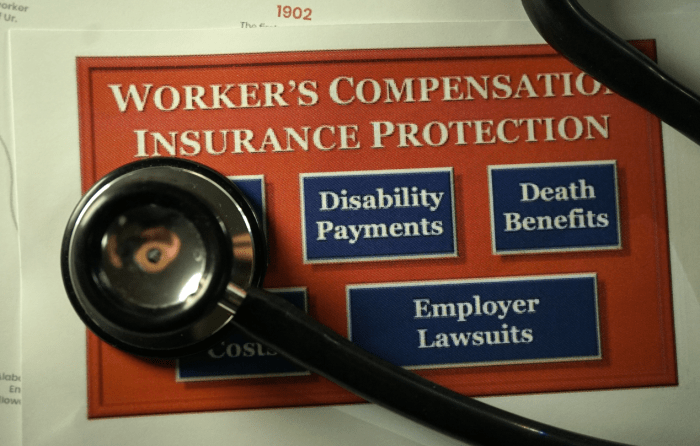
Best workers’ comp insurance providers play a pivotal role in safeguarding businesses and their employees. With a multitude of options available, it’s essential to discern which providers stand out in terms of coverage, pricing, and customer service. This exploration delves into the leading contenders in the market, highlighting what makes them reliable choices for business owners seeking to mitigate risks associated with workplace injuries.
As we navigate through the various offerings, we’ll compare coverage options, evaluate pricing structures, and underscore the significance of effective claims handling. Understanding the nuances of workers’ compensation policies can empower business owners to make informed decisions tailored to their specific needs.
Best Workers’ Comp Insurance Providers Overview

When it comes to protecting your business and employees from the financial burdens of workplace injuries, choosing the right workers’ compensation insurance provider is crucial. The market is filled with options, but not all providers offer the same level of coverage, pricing, and customer service. Understanding the strengths and weaknesses of the leading providers can help you make an informed decision that best suits your company’s needs.Several top-rated workers’ comp insurance providers dominate the market, each known for their unique coverage options and competitive pricing.
Providers such as The Hartford, Travelers, and Liberty Mutual have established themselves as leaders due to their comprehensive policies and efficient claims handling processes. Evaluating these factors can significantly affect the overall experience of managing worker injuries and subsequent claims.
Leading Workers’ Comp Insurance Providers
The following list highlights some of the most reputable workers’ compensation insurance providers, recognized for their reliability and overall value:
- The Hartford
-Known for its robust claims support and online resources, The Hartford offers tailored coverage for various industries, making it a favorite among small businesses. - Travelers
-With a comprehensive suite of risk management services and a strong financial standing, Travelers is well-regarded for its customer service and accessibility. - Liberty Mutual
-This provider emphasizes proactive safety management and offers a variety of coverage options, catering to businesses of all sizes. - State Farm
-State Farm is recognized for its personalized service, competitive rates, and a wide range of additional business insurance products. - Chubb
-Renowned for its high coverage limits and specialized policies, Chubb appeals to businesses with unique risks and extensive operations.
Coverage Options and Pricing Comparisons
When comparing coverage options among the leading providers, it is important to analyze not only the policy features but also the pricing structures. Most providers offer similar core coverage for medical expenses and lost wages, yet key differences in policy enhancements and deductibles can impact the overall cost. The general pricing factors include:
- Industry classification – Different industries have varying risk levels that influence premium calculations.
- Claims history – A business with a history of frequent claims may face higher premiums.
- Employee count and payroll – These elements directly affect how premium rates are determined.
Notably, many providers offer discounts for implementing safety programs or maintaining a good claims history, which can lead to substantial savings over time.
Importance of Customer Service and Claims Handling
Exceptional customer service and efficient claims handling are essential when selecting a workers’ comp provider. A prompt, responsive claims process can significantly alleviate the stress associated with workplace injuries. Companies should prioritize providers with strong reputations for customer support, as this can directly impact employee satisfaction and business operations.Key factors to consider in assessing customer service include:
- Availability of dedicated claims representatives who can guide businesses through the claims process.
- Access to online claims submission and tracking, allowing for real-time updates.
- Quality of communication and responsiveness to inquiries.
A provider that excels in these areas will not only streamline the claims process but also contribute to a more positive experience for both employers and employees during challenging times.
“Choosing a workers’ comp insurance provider is not just about the price; it’s also about peace of mind and assistance when you need it most.”
Evaluating Workers’ Compensation Policies

Understanding the nuances of workers’ compensation policies is crucial for business owners to ensure adequate protection against workplace injuries and illnesses. A well-evaluated policy not only provides necessary coverage but can also save costs in the long run. Here, we’ll explore the essential features to consider when evaluating a policy, a checklist for assessing current coverage, and the implications of policy limits and deductibles on expenses.
Key Features to Consider in Workers’ Compensation Policies
When selecting a workers’ compensation policy, several critical features should guide your decision-making process. These features offer insights into the adequacy and effectiveness of the coverage.
- Coverage Scope: Ensure the policy covers a wide range of injuries and illnesses, including those that might occur off-site or during work-related travel.
- Employer’s Liability Coverage: This provides protection against lawsuits filed by employees for work-related injuries.
- Customizable Options: Policies that allow for tailored coverage can better meet the unique needs of your business.
- Rehabilitation Benefits: Coverage that includes rehabilitation services can significantly aid in employee recovery and return to work.
- Claims Management: Effective claims processes can streamline communications and expedite benefits for injured workers.
Checklist for Assessing Current Coverage
Performing a thorough review of your current workers’ compensation coverage is essential. The following checklist can help you evaluate whether your existing policy meets your business needs adequately.
- Review the terms and conditions of your current policy for clarity and comprehensiveness.
- Assess if your coverage limits are sufficient based on your workforce size and risk factors.
- Check if there are any exclusions that could leave your business vulnerable.
- Compare current premiums with other market options to ensure competitive pricing.
- Evaluate the insurer’s claim handling reputation and customer service ratings.
Impact of Policy Limits and Deductibles on Overall Costs
Understanding the relationship between policy limits, deductibles, and costs can help optimize your insurance strategy. Policy limits refer to the maximum amount an insurer will pay for a given claim, while deductibles are the amount you pay out of pocket before insurance kicks in.
Higher policy limits typically lead to increased premiums, offering more extensive coverage, while lower limits can save costs but expose businesses to higher financial risks.
- Policy Limits: Higher limits provide better protection but can significantly raise premium costs. It’s crucial to balance protection with affordability.
- Deductibles: Opting for higher deductibles can reduce premiums, but it places more financial risk on the business. Assess cash flow and risk tolerance before settling on deductible levels.
- Cost-Benefit Analysis: Always perform a cost-benefit analysis when considering changes to limits or deductibles to ensure that the potential savings justify any increased risk.
Additional Insights on Related Topics
Understanding the broader implications of workers’ compensation insurance can enhance both its value and relevance in today’s dynamic business environment. The relationship between workers’ compensation and various revenue opportunities, alongside how modern technology influences purchasing behavior, presents significant insights for businesses. This section explores these themes, particularly focusing on affiliate revenue potentials, the impact of internet platforms and auctions, and innovative methods of using audio streaming for educational purposes.
Relationship Between Workers’ Compensation and Affiliate Revenue Opportunities
The interplay between workers’ compensation insurance and affiliate marketing can create lucrative opportunities for businesses. Affiliates can earn commissions by promoting specific workers’ comp policies or insurance providers. This relationship benefits both the affiliates and the insurance companies, as affiliates bring targeted traffic and leads that can convert into policy sales. Key points to consider include:
- Affiliates provide valuable content that educates potential insurance buyers about various policy options and benefits.
- Strategic partnerships with reputable insurance providers can enhance credibility and trust among consumers.
- Affiliate networks can facilitate access to competitive commission structures and promotional resources.
By leveraging these connections, businesses can not only boost their income but also contribute to a more informed consumer base regarding workers’ compensation insurance.
Influence of Internet Platforms and Auctions on Workers’ Comp Insurance Purchases
The digital landscape has transformed how businesses procure workers’ compensation insurance. Internet platforms and online auctions now play a pivotal role in the decision-making process for business owners. These platforms often provide a competitive environment where multiple insurance providers can present their offerings, leading to better pricing and terms for buyers. Consider the following aspects:
- Online marketplaces allow businesses to compare policies quickly, fostering a more transparent selection process.
- Auction-based models can drive down prices as insurers compete for business, ultimately benefiting the policyholder.
- Reviews and ratings on these platforms often guide consumers in choosing reputable insurers, enhancing market accountability.
The ease and efficiency of these methods empower decision-makers to make informed choices, aligning their coverage with specific business needs and budgets.
Leveraging Audio Streaming to Educate Businesses on Workers’ Compensation Options
Audio streaming platforms, such as podcasts and web-based seminars, provide dynamic avenues for educating business owners about workers’ compensation insurance. By utilizing engaging audio content, companies can reach a wider audience and convey complex information in an accessible format.Important considerations include:
- Podcast series can feature industry experts discussing trends, risks, and best practices related to workers’ comp.
- Interactive sessions allow for real-time questions and answers, enhancing engagement and understanding.
- Regular updates through audio content can keep businesses informed about legislative changes and policy innovations.
This approach not only positions organizations as thought leaders in the insurance space but also fosters a well-informed business community capable of making sound decisions regarding their workers’ compensation needs.
Concluding Remarks
In conclusion, choosing the right workers’ comp insurance provider is a critical decision that can impact the well-being of employees and the financial health of a business. By assessing coverage options, pricing, and customer service, business owners can find a provider that not only meets their requirements but also fosters a supportive environment for their workforce. As the landscape of workers’ compensation evolves, staying informed and proactive will ensure continued safety and compliance.
FAQ Summary
What factors should I consider when choosing a provider?
Key factors include coverage options, pricing, customer service, and claims handling efficiency.
How can I assess my current workers’ comp coverage?
A checklist can help you evaluate essential features, limits, and deductibles relevant to your business.
What is the impact of policy limits on my costs?
Higher policy limits can lead to increased premiums, but they also provide greater protection in case of significant claims.
Are there any online resources for comparing insurance providers?
Yes, various online platforms allow for comparison of coverage options and pricing among different providers.
How does customer service affect my choice of insurance provider?
Good customer service can significantly streamline the claims process and improve the overall experience when filing claims.





